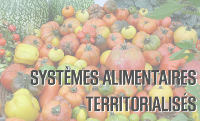MOOC - Actors, levers, tools to lead the transitions of the food system

2018-2019 - Realization of the MOOC Actors, levers, tools to lead the transitions of the food system with Cap Rural, the Unesco Chair Alimentations du Monde and IUFN, with the participation of the Daniel and Nina Carasso Foundation, on behalf of the CNFPT
For several years now, we have seen a resurgence of the food issue in terms of citizen movements caught between demands for a reconnection between the act of producing and the act of eating and the immediate social need for accessibility. These initiatives call on local public authorities to question their ability to propose coherent and ambitious food policies. In France, where food is not an identified and recognized competence of French local authorities, building a food policy that responds to the challenges of the territory therefore calls for bringing together disparate approaches by raising awareness of the common denominator that is food.
The framework for action of Territorial Food Projects, provided for in the law of the future for agriculture, food and forestry of 13 October 2014 (Art 39), has catalysed many approaches while highlighting the difficulty of a systemic approach and the expectations in terms of operational tools and support for transversality.
This online course is open to all. It will be of particular interest to agents of local authorities, project territories and support structures leading or participating in food dynamics on their territory. Whether you work in the economic, health, social or environmental fields, this online course will provide you with elements to understand the new challenges of food and the relationship between food and territories. It will open up operational avenues to help you in your territorial approaches.
(Sessions are only available in French)
Session 1: The food issue on the local government agenda: Why? What are the challenges?
- A post-World War II model that reveals its limitations-
- The systemic nature of the food issue and the socio-technical interlocks of the current industrial food system
- The demand for reterritorialization/relocation of power
- For urban local governments, another step in the long history of cities’ relationship to their food strategy
- Focus on France, orders of magnitude to get there-
Session 2: Conditions for a territorial approach to the food system: behind the diversity of initiatives, common questions to make the system evolve. In this session, the part dedicated to testimonies and initiatives: Examples of the territorialization of the food system in France.
- The diversity of inputs and actors for a territorial approach to the food system
- Clears Common Food Initiatives
- Identifying blind spots: What are the implications of local food initiatives and policies?
Session 3: Focus on "Food and local authorities"
- Restaurant owners, community outreach - what does that tell us?
- For local authorities, a diversity of objectives and approaches around food
- Diversity of areas of intervention and levers of action for food
- Multiple policy frameworks, mechanisms and instruments to build a food strategy
- Distinguishing between project and approach and building multi-level governance
Session 4: Using tools: methods & tools to initiate a food transition approach
- Creating conditions for dialogue: speaking the same language
- Getting a first vision of the reality of the food issue in the territory
- Getting elected officials on board and making sure political portage
- Identifying actors, actions and revealing linkages-
- Organizing the territorial engineering network and work in project mode
All of these sessions are available here